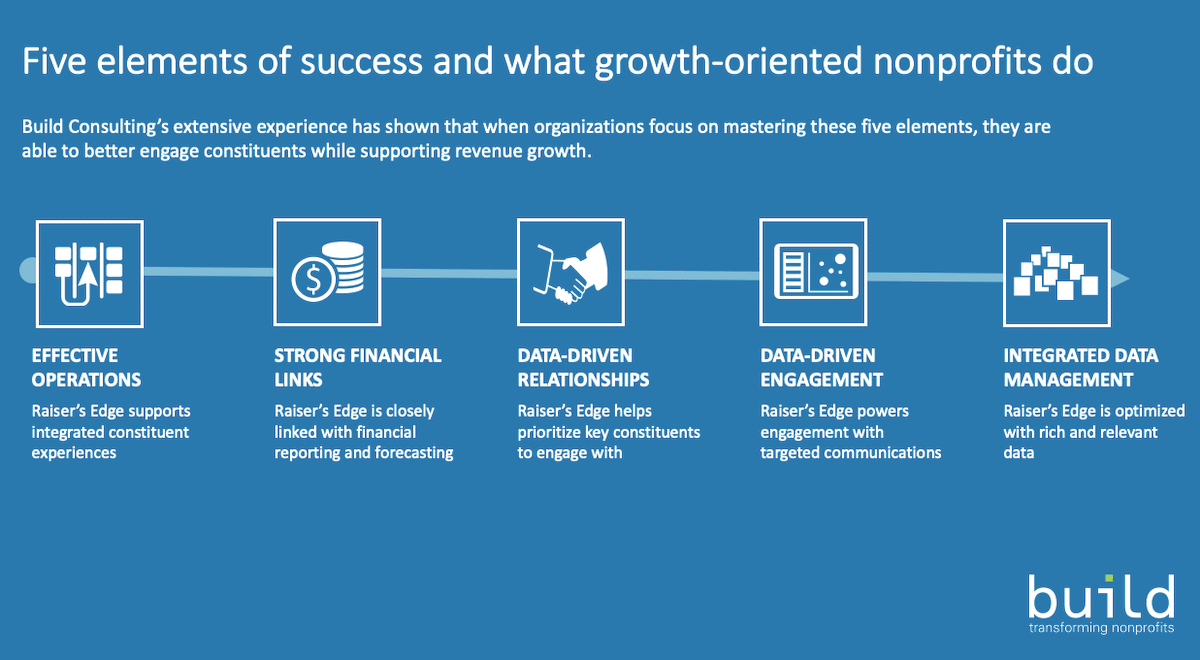How Can Your Organization Master Nonprofit Data Management?
Build Consulting’s experience has shown that when nonprofits excel at using Raiser’s Edge NXT (RE) or any Constituent Relationship Management (CRM) platform to better engage with and manage constituents, they will increase revenue, foster internal collaboration and decrease the operational costs associated with fundraising.
In this article, we share five Raiser’s Edge CRM best practices from growth-oriented organizations, and these best practices work for ANY platform, in addition to Raiser’s Edge NXT. If you have questions about Raiser’s Edge or about our how our team of experts can help you get the most from your CRM, or need to perform a CRM software selection process or making sure your implementation is a success, we’d be happy to have a conversation with you.
Your CRM is a powerful tool you probably already own. When your organization commits to utilizing your data to best manage your relationships, you can unlock additional fundraising insights. But to have a CRM that works, the data must be accurate.
The nonprofit organizations with the strongest and most efficient fundraising operations view Raiser’s Edge or any CRM as a strategic tool that drives decision-making and supports organizational strategy. A CRM allows you to better engage with and manage constituent relationships, and will help you seek opportunities to optimize the business processes that your CRM supports. Excellence in data management will let you move from anecdotal understandings of constituent interests and behaviors to see if the data supports your intuition. Growth-oriented nonprofits carefully choose, nurture, and prioritize their CRM management, seeing it as a crucial foundation for Development operations.
Build Consulting has good news for fundraisers. We have identified several areas where your organization can focus efforts based on common characteristics of “Growth-Oriented” nonprofits. Here are our top five CRM best practices from growth-oriented nonprofit organizations.
Five Raiser’s Edge CRM Best Practices from Growth-Oriented Nonprofit Organizations
Effective Operations
Growth-oriented nonprofits approach Development Operations as an integral part of the constituent experience. They elevate Development Operations beyond simply an administrative function and see it as having a direct impact on how constituents, and donors, experience their organization.
- Development operations are led by experienced managers who are well-integrated into the organization
- Processes are designed and supported in a way that no more than 50% of staff time is focused on gift handling and processing
- Development leadership nurtures a spirit of “data entrepreneurism,” where staff are encouraged to find areas for exploration and are given ~ 25% of their time to explore areas of interest and projects that lead to a deeper capacity to use data intelligence to drive fundraising
Strong Financial Links
Growth-oriented organizations see their CRM as an integrated part of financial reporting and forecasting. They see it as a vital component of their Financial Management/Accounting tools and use it as a source to project revenue.
- The CRM has well-defined gift classifications that balance the needs of Development and Finance and are developed through coordination with these departments
- The CRM team can assist Finance with monthly financial reconciliation and close, through timely, accurate, and detailed information
- The CRM is the authoritative source of accurate financial forecasts of expected pledges, grants, and prospective gifts in the pipeline
Data-Driven Relationships
Growth-oriented organizations understand that, to maximize revenue, they must take a data-driven approach to prioritize how to manage key constituent relationships.
- Your CRM is the authoritative source to plan for, track, and execute key next steps with constituents.
- Your CRM captures constituent interests and preferences both as expressed by constituents and what your data “shows”
- Your CRM maintains a rich history of interactions and touches that helps constituents feel understood and appreciated by your organization
Data-Driven Engagement
Growth-oriented organizations capture the ways that constituents engage with them as well as the ways that the organization attempts to engage with constituents.
- Your CRM is seen as the driver of outbound engagement strategies and execution
- Your organization is capable of making inferences about constituent interests and preferences by virtue of inbound and outbound engagement history
- Your CRM allows Development to take targeted approaches to outbound engagement to limit constituent fatigue and reduce expenses, and your CRM allows testing of various engagement strategies to hone your approaches to what works for your constituents
Integrated Data Management
Growth-oriented organizations understand that high-quality data is an asset that requires sustained investment. Organizations integrate and value data projects that help maintain and improve data health and completeness.
- Organizational initiatives include discussions about how the initiative is supported by processes, data, and technology
- Leadership has articulated definitions for the essential data that drives engagement with constituents, and outcome measurement for internal metrics; these definitions are kept in written documentation that is revisited and revised on a regular schedule
- The CRM management team creates processes to regularly evaluate and remedy data quality issues; data quality is seen as an organization-wide priority
The Bottom Line: Raiser’s Edge NXT/CRM Best Practices from Growth-Oriented Nonprofit Organizations
Growth-oriented nonprofits prioritize CRM strategies, including governance, processes, and data collection tactics that utilize this powerful tool to its fullest potential. Integrating the CRM and data team into Development, Operations, Finance, and Executive decision making is a step any nonprofit should make if they want to experience continued growth.
Need more resources?
If you are stuck with data you don’t trust, are having trouble integrating data management into your decision-making at an executive level, or know your fundraising is suffering but don’t know where to begin cleaning up your data, you can contact Build for a free consultation on how to best move forward.
Build can also act in an outsourced data management capacity to get you back on your feet.
Our CRM data management teams know nonprofits, fundraising, and CRMs, and we are Raiser’s Edge experts. We’ll improve how you manage and use your data so that you are working more strategically and effectively, strengthening your relationships with your constituents using data. Our experts combine deep nonprofit experience with a set of best practices. We provide you with all the benefits of a high-caliber internal database administrator, without the need for you to recruit or train for that role in a market where high-quality talent is hard to find and difficult to retain. Learn more on our Nonprofit Constituent Relationship Management (CRM) solutions here.



